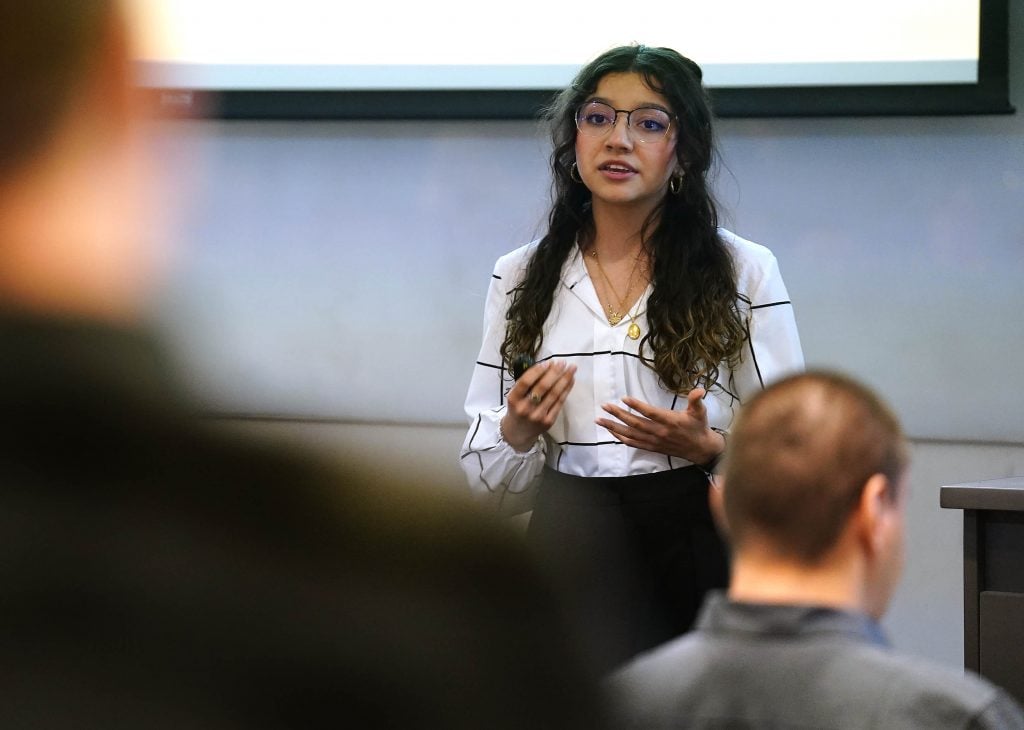
Event a funnel for new Canyon Journal of Undergraduate Research
Photos by Ralph Freso / Slideshow
If you’re not highly motivated, Daniela Chavira will be highly motivated for you.
The Grand Canyon University psychology/pre-med major worked as a program fellow for Immigrant Scholarship Hustle (ISH) in 2021-22, a program that coaches undocumented and DACA students to apply for college scholarships.
When one of the students she mentored wouldn’t answer her mandatory one-on-one phone calls, she did what any highly motivated person would do: She called his mom.
“A second afterward, he was texting me immediately. … He’s in college now. I’d like to think my methods worked,” said Chavira.
She was among 11 student presenters on Wednesday spanning the University’s colleges that shared six research projects and other scholarly projects with the GCU community — including college leadership — at the Canyon Undergraduate Research Symposium.
Formerly called the Learning Communities & Research Symposium, the event’s new name reflects its tie to a soon-to-debut publication, the Canyon Journal of Undergraduate Research.
In her talk, “Supporting Our Most Vulnerable First-Gen Students: The Role of Immigration Status in the Pursuit of Higher Education,” Chavira pointed out how 2,000 undocumented students graduate from Arizona high schools. Of those, only 5 to 10% enroll in college and only 4% attain a degree.
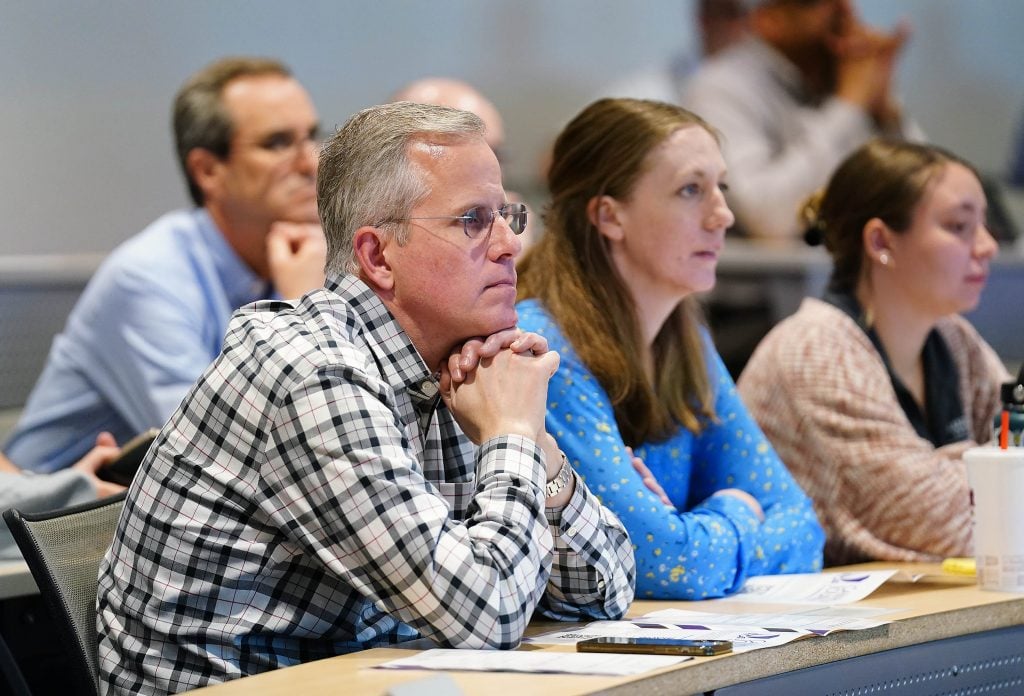
“So why are these numbers so small?” Chavira asked.
She detailed some of the barriers: financial and language obstacles and “blind support” from parents who don’t know a lot about the college process.
For ISH, she conducted bilingual virtual orientations for high school students and their parents, helmed six-day virtual educational workshops and provided social-emotional learning “to heal that trauma that comes with being an immigrant.”
She also offered mentorship and spoke of one student who became homeless during the pandemic.
“I didn’t know how to help her. I didn’t know how to apply anything I knew for housing,” Chavira said, but told her: “We’re going to figure it out.”
That student was awarded a full-tuition Students Inspiring Students scholarship to GCU. All the students she mentored received scholarships, six of them full-tuition scholarships.
Chavira spoke about the importance of learning alongside these students, safe spaces, bridge programs — such as the Spanish-language orientations offered by GCU — and mentorship.
“I cannot describe how impactful mentorship is. They can’t go to their parents to ask these questions … mentorship is key.”
Chavira shared the Canyon Undergraduate Research Symposium stage with students whose topics ranged from the wildly successful GCU Women in Business Club to the trappings of individualism through a Christian lens. Another presenter spoke about the relationship between perceived family social support and self-efficacy, and one group detailed its work with cyanobacteria, a microorganism that can be used to produce a clean biofuel called molecular hydrogen.
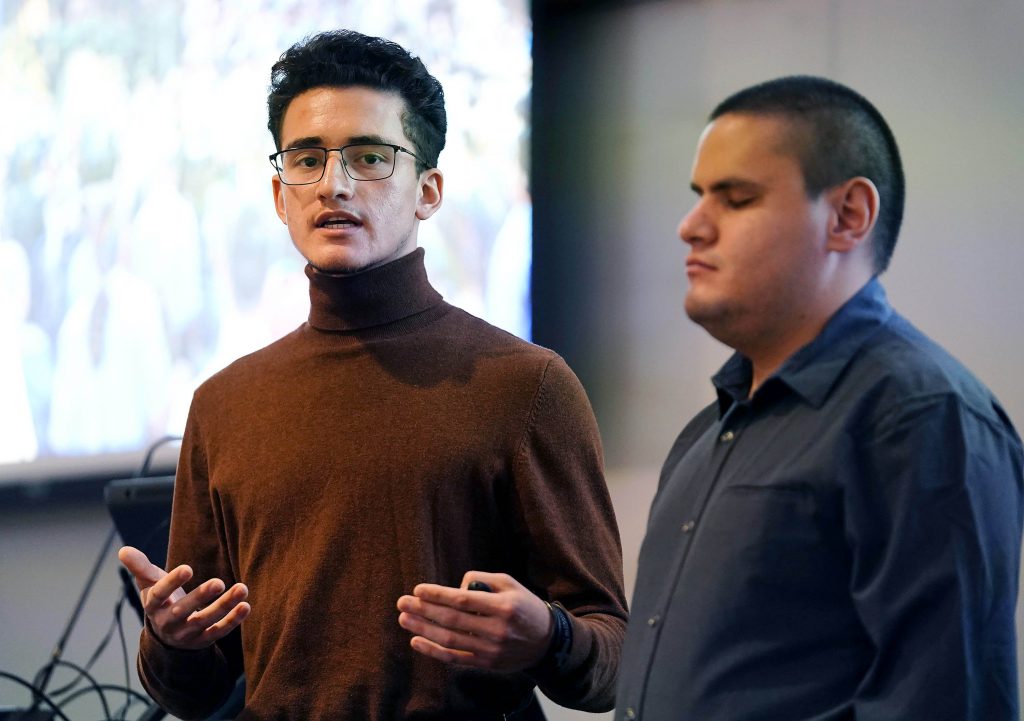
What makes this event unique, said Honors College Program Manager Katalina Inzunza Herrera, is that it’s not college-specific. A committee made up of representatives from each college is involved in choosing from the applicants for the event, facilitated by the Honors College.
Not only is it interdisciplinary, but it’s open to the entire ground undergraduate student population, so students don’t have to be seniors to present.
“The other thing that is really also impactful is that we invite our academic and executive leadership,” said Inzunza Herrera.
She added, “A lot of these students work very hard. They prepare for a few weeks,” doing practice runs and receiving coaching.
What’s also special about this symposium is that it’s an opportunity for students to publish their work in the Canyon Journal of Undergraduate Research.
“We changed the name of this event so it can become kind of a funnel,” Inzunza Herrera said. “Students who submit for publication, if they haven’t presented, they’ll come and present, or students who present, if they haven’t submitted their work for publication, they can submit (to the journal).”
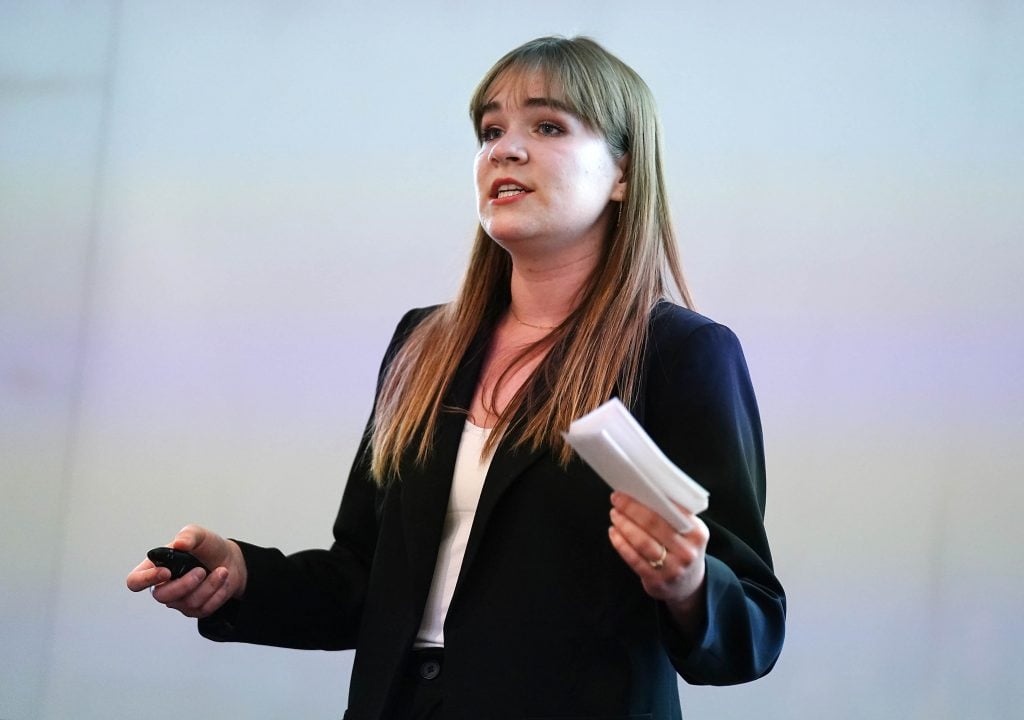
Another presenter, Abigail Van Wetten, spoke about “The Relationship with Reading Among the Youth of Today.”
The English for secondary education major wanted to find out what factors contribute to why Generation Z (born from 1997-2009) and Generation Alpha (born from 2010-24) no longer read. They’re most affected by the issue, “as they grew up in a world that did not know society free of the existence of technology or social media,” Van Wetten said.
She noted that 23% of American adults say they haven’t read a book in whole or in part in the past year, whether in print, electronic or audio form.
That reading disconnect, she discovered, can be attributed to technology and media, which have resulted in restless and overstimulated youth whose attention span has grown shorter and shorter.
She said stakeholders, such as parents and educators, also play a role in fostering the love of reading: “If it is promoted in a child’s life, reading will become a positive thing,” she said.
And she discussed the negative effects of the COVID-19 pandemic.
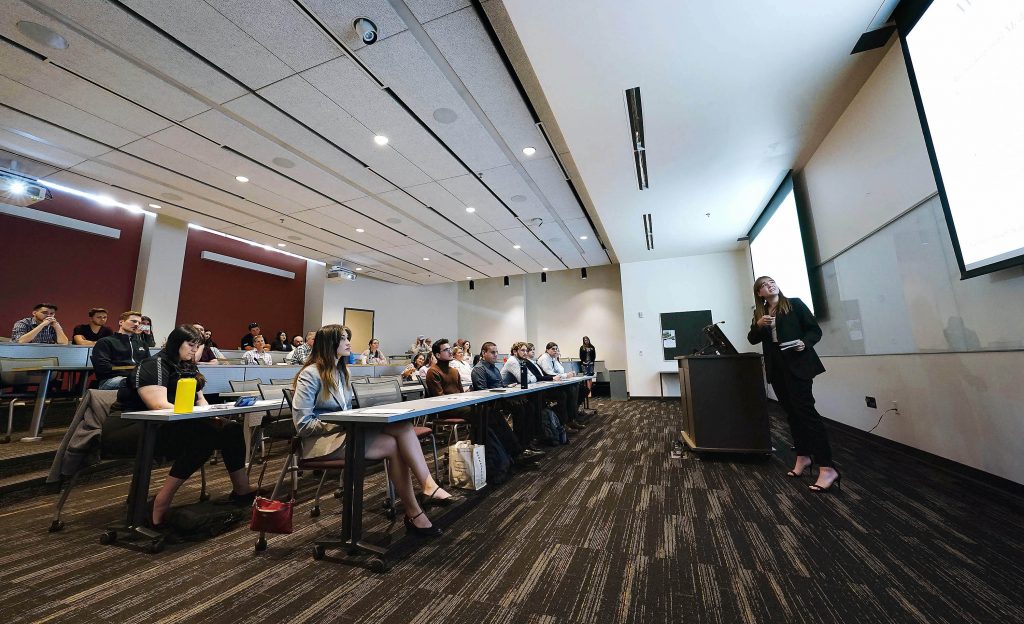
Van Wetten’s takeaways: promote reading habits and destigmatize it on the familial level; give back control to the youth in what they read, such as letting them choose the titles on book lists; and adapt to children’s altered, hypervisual and hyperactive learning styles.
She wants to incorporate graphic novels in the classroom, more hands-on activities and group discussions.
Other talks at the event:
- “The Relationship Between Perceived Family Social Support and Self-Efficacy in Young Adults From Collectivistic Populations,” by Hannah Beggs from the College of Humanities and Social Sciences. Advisor: Dr. Magen Branham
- “Iraneus and Individualism,” presented by Thomas Gonzales, Joel Kucklow and Caleb Gilbert from the College of Theology. Advisor: Dr. Ryan Brandt
- “Physiological Characteristics of Cyanobacterial Cultures and Genetic Manipulations of Uptake Hydrogenase,” presented by Luke Bamrud, Micah Fogo and Claire Frank from the College of Science, Engineering and Technology. Also part of the team but not presenting was Jessica Doan. Advisor: Dr. Galyna Kufryk
- “GCU Women in Business Club,” presented by Belle Rakestraw and Lily Portale from the Colangelo College of Business. Also part of the team but not presenting was Maya Strautman. Advisor: Dr. Allison Mason
Presenter Hannah Beggs said she wanted to apply to be a presenter because she’s just so passionate about the subject she spoke about.
“It helps that we all like what we’re doing,” she said. “ … This (project) has consumed my life for a little over a year now, so it’s nice to kind of see actual results coming from it.”
Chavira, after her talk, shared how she, too, is passionate about her subject. She is dedicated to helping immigrants get a college education.
This (project) has consumed my life for a little over a year now, so it's nice to kind of see actual results coming from it.
Hannah Beggs, Canyon Undergraduate Research Symposium presenter
“The way I saw the students struggle, I know the struggle, and I was just like, I need to talk about this. Someone needs to know,” said Chavira, whose immigrant family moved to the United States when she was 10 months old.
When she found out university leaders, such as President Brian Mueller, attend the symposium, she wanted to share her work with them, “because I think administration would benefit from hearing from this.”
“My undocumented students have an immigration barrier to them that we can’t really control, but we can help them. That’s where I saw that need,” she said.
The first Canyon Journal of Undergraduate Research will be published in June.
GCU News: Honors Research Symposium highlights diversity
GCU News: Scholarly research on display at symposium, showcase
GCU News: CHSS showcase is a scholarly, deeply personal experience
GCU News: Engineering capstone projects smoke the competition



































































